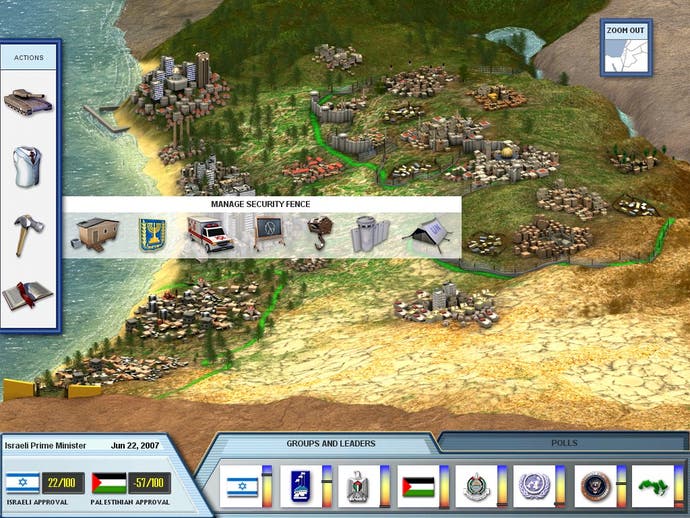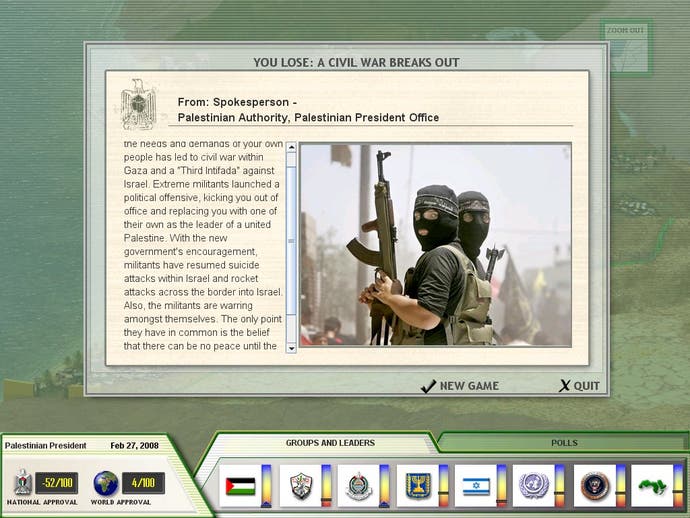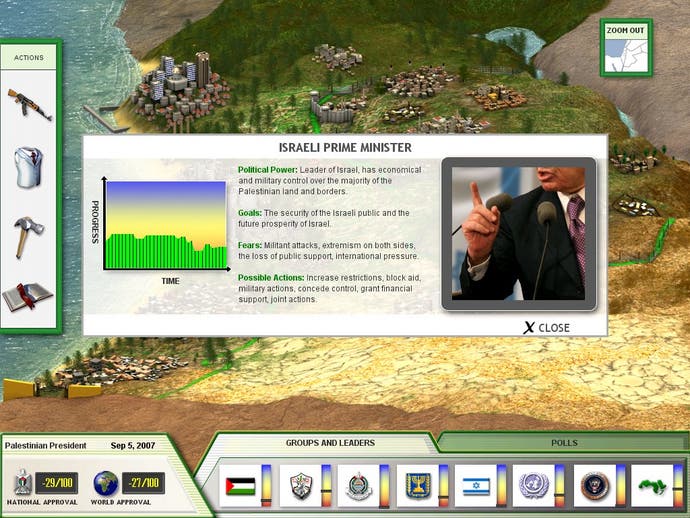Peacemaker
Feud for thought.
As I sit here writing this, the streets of Tel Aviv are filled with thousands - maybe hundreds of thousands - of people calling for the resignation of bungling war leader Ehud Olmert. By recent Anglo-American standards his mistakes were minor yet they still want shot of him. Demanding folk the Israelis, as you'll find out if you choose to play as their PM in this honest, harrowing, but ultimately hopeful simulation of Israeli-Palestinian hatchet-burying.
Feeling the hurt
I'm not a particularly emotional gamer (at least, I don't think I am) but the first time I realised I'd 'won' a game of Peacemaker, tears came to my eyes. The unexpected brine was coaxed out by a particular photograph on one of the final 'peace milestone' screens - a picture of carefree kids messing about on bikes on a summer evening. For much of the game you're bombarded with very bleak images: policemen rinsing blood off tarmac, parents inconsolable with grief, young suicide bombers standing before flags... All this authentic sorrow and tragedy inevitably generates some vicarious pain. When peace finally arrives (assuming it does) that pain turns to joy and relief. For a few poignant moments you get an inkling of what peaceful co-existence in the Middle East might actually feel like... what it might mean. Unusual territory for a videogame.
If ten quid for a few seconds of empathy sounds pricey then bear in mind that Peacemaker is also a stimulating (if small) one-player strategy game. Playing as either the Israeli or Palestinian premier the object is to bring about 'the two-state solution' - the only peace framework with a cat in hell's chance of ever being accepted in the region. Time is chunked into week-long turns sandwiched between events phases. Each turn you get to pick a single action from a palette of activities that includes speeches, international diplomacy, security ops and economics. The selections are different for each side. Predictably the Israeli player has sheqels to burn and can influence the life of the Palestinians in dozens of different ways (through curfews, roadblocks, work permits, wall-building, bulldozing etc.) while the Palestinian president is as poor as a mosque mouse and is essentially powerless outside of the barbwired borders of the Occupied Territories.
Taming the Zion lions

Faction imbalances like these obviously wouldn't work in a traditional strategy game. Here, though they impact the way each side plays, they have little effect on your chances of success. The Israelis' big budget, mighty army, and geographical advantages don't make it any easier to convince the Knesset that settlement dismantling is the way to go. The Palestinian's beleaguered homeland and meagre funds aren't really a factor when it comes to winning travel or trade concessions from the Israelis.
Well, actually that's not completely accurate. If you choose to pursue peace as the Arabs you do find yourself spending a lot of time trying to cadge cash from international bodies like the UN and EU, and neighbours like Egypt and Jordan. Without financial assistance it's impossible to reconstruct your strangled economy and develop the police force necessary for controlling the militant wings of Fatah and Hamas (the main Palestinian parties). Why should you care about the Izz ad-Din al-Qassam and al-Aqsa Martyrs' Brigades? These are the masked gunmen and bus bombers that will wreck your bridge-building and drive you from office given half a chance.
Growing olive branches

Whichever side you pick, the secret of success is trust - maintaining it in your relationships with 'friends' and nurturing it in your relationships with 'enemies'. At the bottom of the screen are a row of thermometers that display your approval levels amongst the various groups involved in the peace process. To make any progress it's essential most of the mercury stays high. Keeping everyone sweet isn't too hard a task at lower difficulty levels; at higher settings however, it can be murder, a single checkpoint firefight, heavy-handed air raid, or clumsy anti-militant op instantly dissipating months of carefully cultivated goodwill. The feeling of 'one step forward, one step back' that characterises so many peace processes is beautifully captured. Maybe too beautifully for some.
Those gamers that like transparency in their strategy entertainment, may find Peacemaker's fuzzy feedback and unhelpful map disconcerting. The Civ-style view of the Middle East that dominates the play screen really only functions as an interface for accessing the incident reports ('martyr operations', rallies, crackdowns... etc) generated between turns. If you want to gauge militancy levels, or find out what's uppermost in the minds of your populace you have to rummage about in a needlessly atomised 'polls' display. Impact Games' inexperience with interface design also shows in the missing message logs and sound configuration options, and the inflexible menus. There's a cool-off period for certain actions, but no way of monitoring this. Regularly you find yourself choosing an apparently available action only to be told, a few clicks further on, to come back later.
Grinding the axe

Peacemaker might have some minor mechanical flaws, but thankfully there's no sign of a potentially more damaging weakness - bias. My propaganda antennae were vibrating like crazy when I first heard about the concept, but, after many plays I still haven't detected any sinister hidden agendas. Does the fact that it's harder to win as the Israelis mean anything significant? I doubt it. Even if there is any inadvertent imbalance it must be viewed against the game's amazingly positive educational potential. As the old Indian proverb goes, there's nothing like walking a mile in another man's moccasins for promoting understanding, destroying prejudice, and spreading verrucas.
This game has a feel and an approach all of its own - a big plus point in the sequel-stuffed genre of turn-based strategy. While the narrow theme inevitably limits replayability, longevity, and appeal, I've found the challenge of pulling off a peace deal at the toughest difficulty level keeps drawing me back for an hour or two's play every so often. Call me soft, but I want to taste those hopeful tears again.







